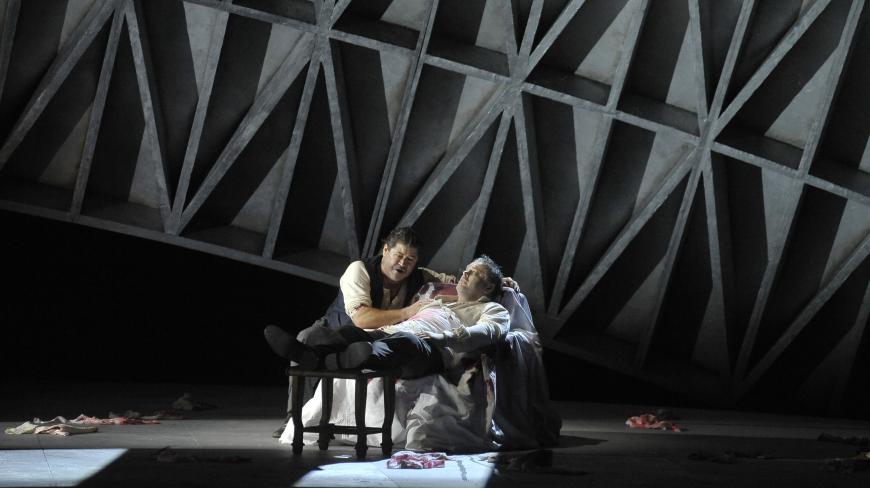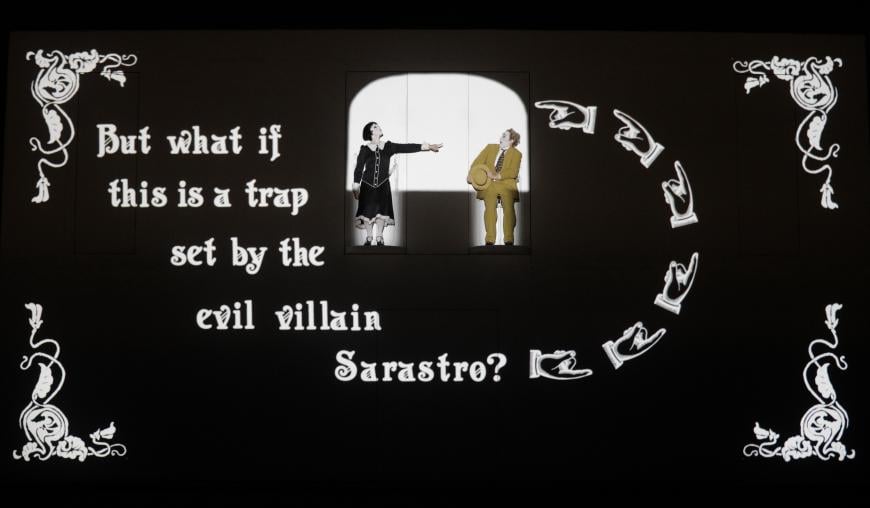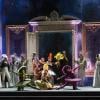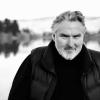
Kwangchul Youn, a veteran bass from South Korea whose illustrious career has taken him to all the major opera houses of the world, beginning with a 10-year stint at the Berlin State Opera, makes his belated West Coast debut this month as the benevolent Sarastro in San Francisco Opera’s The Magic Flute.
Youn, whose wide-ranging repertoire will be fully represented in San Francisco this year between the current Sarastro and next season’s King Marke in Tristan and Isolde, deploys his full-toned, resonant bass with both Mozartian elegance and Wagnerian bite, creating rounded characters not only through his carefully calibrated sound but in the authoritative yet fully human presence he brings to the stage.
Youn spoke with SF Classical Voice ahead of the Magic Flute performances, which run May 30 – June 30. This conversation has been edited for clarity.
You grew up in a small village in South Korea. How did you get steered in the direction of an opera career?
When I was born, my town [Chungju] had no electricity. We had oil lamps and really nothing [else] —no radio, no television, no connection with Western music. In my first school, I learned the names of Western composers — Bach and Mozart and Beethoven — but never heard their music. After my voice changed, it was very low. Far away, near the city, there are some churches, and I sang in the church choir with my friends, and then I realized my voice was different from a normal voice.
In school, I studied architecture, and I was not successful. Then I had an idea that [because] I have a very good voice, I have to try singing. At a very provincial university, I studied music education, and I met a voice teacher who spent four years with me. Then I tried some small competitions in Korea, and I won a prize. After university, I did my normal Korean military service, two years, and then I could have been a music teacher in a middle school or high school. But I wanted to know why, in one lied I studied from [Robert] Schumann’s Dichterliebe, it was “wunderschönen Monat Mai” [wondrous month of May]. In Korea, spring is March, earlier, so I wanted to know why the poem is different, why the culture is different, and this was my reason to study in Europe.
My parents were farmers, and they made money just in the autumn harvest. Of course, they could not spend money for my studies. After perestroika [the restructuring of the Soviet Union in the late 1980s], it was very cheap to go to Bulgaria. Also, in my university time, I knew Nicolai Ghiaurov and Boris Christoff were famous Bulgarian basses, so I thought I have to go [at least] one time to Sofia.
What led you from Sofia to your contract at the Berlin Staatsoper?
In 1991, I met my wife, who at that time was studying in Berlin. First, I studied at the Berlin Hochschule für Musik, and then, in 1993, I was one of the winners in Plácido Domingo’s Operalia. It was on TV in all Europe, and someone heard me and proposed that I audition for the Berlin State Opera. Daniel Barenboim took me in the ensemble. Over 10 years, I sang many French and Italian operas, and some days I rehearsed in three different languages. It was really a very, very good time for my basic technique. I felt like I was a student in opera. We had Peter Schreier in the ensemble and Theo Adam and Siegfried Vogel — many legendary singers — and I learned really a lot there.

When did you make your first foray into the Wagner repertory?
I never thought of the Wagner repertory, or the German repertory, [for myself] because I have so many colleagues from Germany or Austria or Switzerland. I’m Korean, and for German opera in Germany, German singers are the first choice. In 2002, I had worked and worked and studied [the role of] Landgraf Hermann [from Tannhäuser], and I auditioned for Bayreuth, but I never thought they would take me as the German king. I was very surprised when they did. It was my first big success in Wagner.
You are a very theatrical performer. What are the keys to your authoritative stage presence?
I am not so tall — I’m a little guy. When I was at the Berlin State Opera, I met many times Harry Kupfer, the stage director. He was not so tall, same like me. With Mr. Kupfer, I did Meistersinger and Rheingold and Walküre and also King Marke. He taught me many things about how to look bigger onstage. One time, I was Fasolt, and the Fafner was two meters bigger than me. Maybe I came to his shoulder. Mr. Kupfer told me, “Don’t look up at him by lifting your chin. Just look at him with your eyes.” He taught me how to move onstage to look like a king or a giant. For example, I did Magic Flute with Matti Salminen; he was Sarastro, and I was the Sprecher. In the first-act final chorus, we had to stay onstage, and Kupfer told me, “Don’t go near to him — take up space for a big person!”
What is your approach to vocal technique?
I listen to many sopranos and tenors with high voices because it’s helpful for my voice and for my technique. To my mind, I have to not sing like a bass. I sing more lightly and softly and more like a tenor. I don’t think my voice is big and low — for me, my voice is not so big, and I have to adjust the technique like a tenor. I hear, for example, colleagues like Juan Diego Flórez — a small voice, but everywhere we can hear him very well. I think like a tenor — very fine and very focused singing.

What are the biggest differences between your two upcoming San Francisco roles, Sarastro and King Marke?
My European debut was Sarastro in 1993 in Leipzig. It’s a very low role for a young bass. Ten years in Berlin, I sang Sarastro many times, but I was never happy. I never enjoyed it. Young basses always try to make a big, dark sound, and I also tried that. But now, I have been onstage for more than 30 years, and I know better how to approach it and how to command the role.
King Marke is Wagner, and there are many long phrases, and I have to show many different colors. I have to be very careful when singing Sarastro — it should be not like Wagner. Mozart should be very simple in the presentation, and I have to approach it like bel canto, like early music. I have more than two months to change my [vocal] character after Sarastro. I have planned many Wagner operas — after King Marke here, then Rheingold in Paris and Parsifal in Hamburg. There are many big, big orchestras, and it will be heavier. Also, in the U.S., the auditoriums are bigger than in Europe, and I have to be careful with my voice. Even on a big stage, I have to sing with my voice. This is my plan with Wagner and also with Mozart.
How has the opera world changed since you began your career?
When I was in Berlin, for some operas we had six weeks, sometimes eight weeks rehearsal, and we had long discussions about the characters and their personal connections. Now, there’s not so much money for the productions, and sometimes they rehearse only three weeks, four weeks, and then put on the opera. We can do it, of course, but to establish the personal connections within the opera — it’s not there.
Also, now, the stage director wants something, and we have to do it. Now, opera singers can’t say, “I’m uncomfortable,” or “I can’t do that,” or “It’s not for me.” The ideas from the stage directors are very changed — the opera [becomes] a totally different interpretation from the original. They make a different [interpretation], and they say to young singers, “Do it.” Now, the stage director is so powerful, and some powerful stage directors can’t read a score. This is really difficult for singers. You have to talk about the role and the story — “This is my idea for the role” — and then you have to match the stage director’s ideas, and you have to meet in the middle.
When you’re offstage, what keeps you happy and centered?
Sometimes I play golf. I began with golf in Bayreuth because in Bayreuth there are two golf places. Early in the morning, maybe 5 a.m., I go just alone in nature. There’s nobody. I play just alone with my golf ball, and I forget what was stressful yesterday or some places where I was not together with the orchestra — I forget everything. And golf is played just with me, myself, not competing with the other person. It’s just for me — also for mind control and to calm down. It’s a really good sport.
Tell me a little bit about balancing family and career.
I have two daughters, now 29 years old — twins. It was a very difficult time when they were young. When I was a freelancer, they moved back to Korea, and I was just alone many places. But they visit me in many opera productions — for the music, and they are also very excited by the new cities. They will be coming here to San Francisco. Of course, they have Korean passports, but I think they are world citizens. My two daughters live in Munich, and they take their vacations and visit me.
Do you feel a connection with the audience when you’re onstage?
Of course. When I sing a recital, I wish every time it could be not so dark in the [opera-house] auditorium. I want to see the people. I want to see also their eyes, what they’re thinking. Somebody closes their eyes, somebody is thinking about the past, somebody sleeps. [Laughs.] In the opera house, I can only see the people in the first nine or 10 rows. But it’s very, very important for me.




